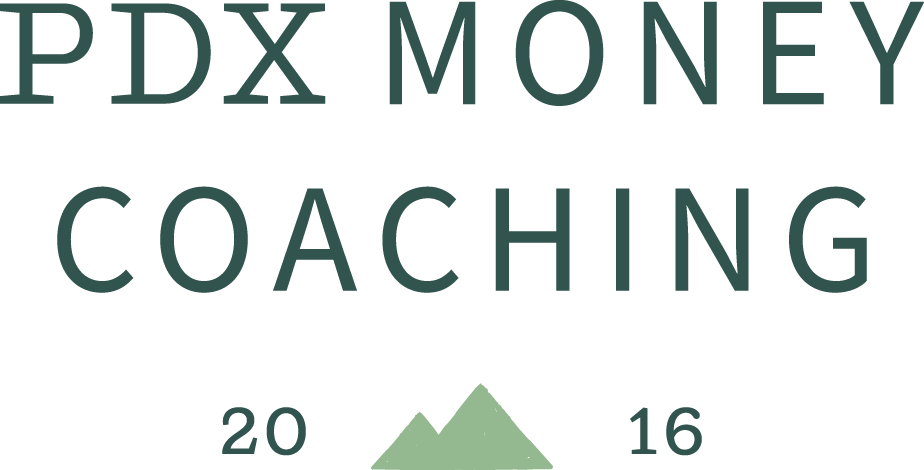Developing Good Money Habits
The last three mornings I've drank a pint of water before coffee, which for me is a huge win! I've been trying to instill this habit my whole adult life, as I know how much better it makes me feel. Coincidentally, I happened to listen to this awesome Brené Brown interview with James Clear of Atomic Habits that first morning- which I highly recommend.
Listening reminded me how important tiny changes are, and how massively important it is to start building evidence that we are becoming the person we want to be.
"Your habits are how you embody your identity." - James Clear
When it comes to any sort of transformation - even if it is just becoming someone who stays hydrated - we need to start stacking up evidence that supports we are someone who now does this, as we will then believe and embody the new identity... which only encourages continuing the healthy habits.
Being 'good with money' is no different.
Most of us want to be 'good with money,' yet it feels so overwhelming to know where to start. It also might take us a while to even know what that means to us. However, there are always small steps you can take to start reinforcing that this is your new identity.
Next time you find yourself unsure of how to handle a decision around money, ask:
"What would someone who is intentional with their money do?"
"What would someone who doesn't stress about money do?"
"What would someone who is wealthy do?"
The answer might surprise you. Let's use the example of ordering lunch, as James Clear gives in the interview. Someone who is healthy could get away with ordering a burger and fries for lunch once in a while, but not every day - as then they might not be healthy anymore. In general, they probably eat a balanced meal with vegetables and lean protein, for example.
When you're wondering if you want to spend money on something, it's easy to think that a wealthy person would be able to spend money on it, so I want to, too! However, if you've ever read The Millionaire Next Door, you know that's the biggest falsehood about what it means to get, and stay, wealthy.
Most millionaires didn't come from money, and are in fact largely frugal and self-employed. They often drive older cars, and make things last. You often can't tell from the outside that they are wealthy... and in fact, people who may appear 'wealthy' from their material posessions or vacations may actually be living paycheck to paycheck... you never know.
Progress always results from consistent actions, aka, habits
Here are some possible responses to the question, "What would someone who doesn't stress about money do?"
They regularly engage with their money.
They might regularly practice the '72 hour rule' before spending money on something, and research options to make sure they are making an educated purchase (and not paying too much).
They might have the habit of asking themselves, 'Will buying this thing or experience give me enough satisfaction or fulfillment to make spending the money worth it?'
They would also have an awareness of whether or not they could actually afford the expense, and if not, what they could change/rearrange/trade-off/etc in order to happily spend the money on what they wanted. This, however, requires having a clear system for managing your money and making clear decisions. (which is also what financial coaching is all about.)
Where can I start?
Consider what SMALL actions you could take so that you could start believing you are someone who is good with their money. This could be taking just two minutes per day to look at your accounts, pay your credit card balance, ask for money that is owed to you, estimate your vacation budget, log into your retirement account, etc.
Essentially, by taking action you're saying: "Hey money... I care about you. I really do!"
How to create a good habit: (From Atomic Habits)
Make it obvious. It could mean setting a regular calendar reminder to engage with your money somehow, or tying it to another habit - I look at my accounts while I drink my morning coffee. It could mean keeping your financial mail in an obvious place instead of burying it. 🤓
Make it attractive. Maybe coffee is your reward for checking-in on your money. Find something that motivates you and starts a little dopamine response as you engage.
Make it easy. This could mean making your money app or bank account your home page on your browser (or at least put it in your bookmarks bar.) —-> Forgot your passwords? If it's a hassle to even log into any of your accounts, you are much more likely to lose track of how much is on your credit card this month, or whether a bill is paid. Create a system for easily logging in to any account at any time. You could also set a timer for the 4 minutes it takes your french press to brew. 4 minutes is plenty to build a habit.
Make it satisfying. Track your consistency and wins/progress. Celebrate a certain milestone of consistency.
Thanks for reading, as always. -Emily
